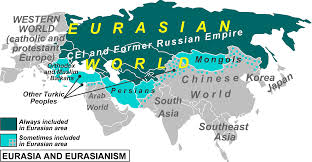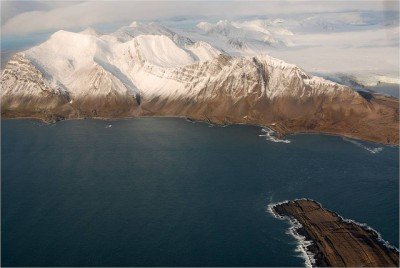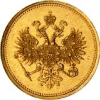(Guest post by A. Kazharski) Russia's project of Eurasian integration has been very dear to President Vladimir Putin, but it was never recognized by his Western colleagues. Is the war in Ukraine meant to change that?
Last month, Chancellor Angela Merkel suggested that in exchange for a solution to the Ukrainian crisis, trade talks could begin between the EU and the nascent Eurasian Economic Union (EEU).[1] For anyone who has followed the Western discourse about Eurasian integration, these words sound very different from what the West was saying only a few years ago. This may suggest that some Western elites are moving closer toward recognizing the EEU, a political gesture, which if it happens, will have serious symbolic repercussions.
Swedish political scientist Erik Ringmar, described the relationship between Russia and Europe as a “recognition game,” whereby the basic need of gaining status through acceptance as an equal by European counterparts was more important to Russian rulers than any immediate material interests. This, as Ringmar argued, led Stalin to ultimately side with Hitler – Russia needed to find “recognition” elsewhere after it was snubbed by Britain and France in 1939.
The 2011 announcement of the EEU by Putin had all the symptoms of a claim for recognition. The intended isomorphism of Eurasian economic institutions with European integration rhymed rather ill with the economic and political realities of the post-Soviet space. But it revealed a zeal to prove that Russia could be no worse than its significant other (Europe), and that it is capable of building its own version of the EU. This was something that Russian politicians declared on many occasions. If only Europe confirmed.
The problem was that Europe was reluctant to grant recognition. There was no intention to institutionalize direct ties between the EU and the new Eurasian institutions – as Putin and others publicly urged. In fact, there has been a pattern in which post-Soviet regional organizations like the CIS and the CSTO would repeatedly seek interregional, bloc-to-bloc cooperation with the West, whereas officials in NATO and the EU preferred to deal with each post-Soviet country individually.
Many Western experts have warned against recognizing the EEU as it would weaken the EU's conditionality instruments and give the authoritarian Eurasian regimes additional political clout.[2] EU officials pretended in public that Eurasian integration did not exist. In private, they admitted that they did not see much sense in cooperating with the EEU because they believed it was not an economic but a political project. And legally, there was no way Eurasian integration could fit into the rigid, non-negotiable framework of the Eastern Partnership, which was designed by “Eurocrats” for post-Soviet states.
In short, Europe refused to grant Russia recognition on the grounds it sought – the Eurasian Union did not merit acceptance as the EU's alter ego. In recent years, the two post-Soviet regionalist projects, the EEU and the EU's Eastern Partnership, clashed in their shared neighborhood. Thus Russia had started to play its “security” trump cards, first in Armenia and then on a truly drastic scale in Ukraine.[3]
These trump cards seem to have eroded some attitudes in Europe. The first considerations of cooperating with the EEU surfaced in the expert community early in 2014, when Ukraine began to plunge into crisis. By 2015, Europeans were so concerned with a war at their doorsteps they apparently started to view the EEU, imperfect as it was, as a lesser evil compared to the horrors of the so-called Russian world movement (Russki mir), particularly the idea of Russia's “responsibility to protect” compatriots and Russian-speakers regardless of international borders.
Merkel's ideas about the EEU were voiced at least for the second time since November, when Frank-Walter Steinmeier, German foreign minister, went to Moscow with “suggestions” that apparently included initiating direct talks between the two blocs.[4] Recent debate by experts has been on this topic. For example, Ivan Krastev and Mark Leonard, members of the European Council on Foreign Relations, point to the “paradox of the current situation” when the best hope for the EU to work with Russia is through “engagement” with the Eurasian Economic Union.[5]
It remains to be seen if such a policy track is followed, but it is clear that we are seeing another round of the recognition game between Russia and Europe. It makes us ask, how much of the war in Ukraine is a means to fulfill the EEU recognition claim? It seems that the approach developed by Ringmar and other scholars of “identity” remains highly relevant.
Still, for politicians and policy experts, the current million-dollar question is whether recognizing the EEU will help at this stage. Can the approach stop the massacres in Ukraine, will it mean a Russian EEU delegate will have a seat in Brussels, then so be it. The downside is that it could reinforce a nasty conviction: it is easier for Russia to destabilize its neighbors than attract them. The message may be that instead of proper institution- building, Russia can simply gain European recognition by jeopardizing everyone's security. Converting military power into symbolic status could become a habit not easily broken.
Aliaksei Kazharski is a PhD candidate at the Institute of European Studies and International Relations, Comenius University in Bratislava, Slovakia. PONARS Eurasia member Andrey Makarychev facilitated this submission.
[2] http://www.eesc.lt/uploads/news/id459/Eurasian%20Union-a%20Challenge%20for%20the%20European%20Union%20and%20Eastern%20Partnership%20Countries.pdf











